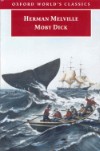| Autor | Herman Melville |
 |
|---|---|---|
| Titel | Moby Dick | |
| Verlag | Oxford University Press | |
| Erscheinungsjahr | 1851 | |
| Bewertung |      |
„This is an odd book“ erkannten schon die ersten Rezensenten von „Moby Dick“. In der Tat handelt es sich um ein Werk, das so einzigartig, schwer zu fassen, monströs und gelegentlich auch anstrengend ist wie, ähm, ein Wal.
Das Buch, das denn auch zuerst unter dem Titel „The whale“ erschien, beginnt wie ein Reiseroman (und zwar ein sofort packender), erinnert manchmal an ein populärwissenschaftliches Handbuch (das dann „Die Welt der Harpunen“ oder „Meeresbiologie für Anfänger“ heißen könnte) und enthält auch Elemente des Dramas (nämlich Regieanweisungen, Szenenbeschreibungen und innere Monologe von shakespeare’schem Ausmaß).
Was ist also „Moby Dick“ – ein Roman, ein Handbuch, ein Drama? Es ist nichts von alledem und alles zugleich. Will man es gattungstechnisch unbedingt verorten, kann man es wohl am ehesten als Epos bezeichnen. Denn wie die „Ilias“ oder „Don Quichote“ erzählt Melville hier eine große Geschichte, unglaublich verspielt, sprachgewaltig und belehrend. Dass er sich selbst dabei nicht so ernst nimmt, gerne auch komisch, ironisch und satirisch wird, macht das Werk noch angenehmer.
Seine wahre Größe gewinnt „Moby Dick“ aber gar nicht aus dem Plot, sondern aus dem Subtext (bösartigerweise könnte man auch sagen: aus der Rezeptionsgeschichte). Melvilles Erkenntnis (wohlgemerkt zur Blütezeit der Industrialisierung) ist ganz simpel: Menschen lassen sich in eine Maschinerie einspannen, um die größten Aufgaben zu bewältigen. Und sie fragen sich dabei zunehmend: Warum?
In der Jagd nach dem Wal findet Melville ein ungeheuer schlüssiges Bild für die Moderne, in Ahab, Ishmael, Flask und Stubb ihre Charaktere und Prototypen. Sie alle versuchen (und Melville setzt das genial in seine Form um), mit Hilfe irgendwelcher Systeme, Kategorien und Listen irgendeine Ordnung in ihr Leben zu bekommen. Sie alle fragen die Welt nach Sinn, und die Welt antwortet nicht. Albert Camus hat das einmal „das Wesen des Absurden“ genannt.
Wie nah Melville den späteren Existenzialisten steht, wird vor allem dann deutlich, wenn Ishmael reflektiert. Beispielsweise hier: „As the profound calm which only apparantly preceeds and prophesies of the storm, is perhaps more awful than the storm itself, for, indeed, the calm is but the wrapper and envelope of the storm; and contains it in itself, as the seemingly harmless rifle holds the fatal powder, and the ball, and the explosion; so the graceful repose of the line, as it silently serpentines about the oarsmen before being brought into actual play – this is a thing which carries more of true terror than any other aspect of this dangerous affair. But why say more? All men live enveloped in whale-lines. All are born with halters round their necks, but it is only when caught in the swift, sudden turn of death, that mortals realize the silent, subtle, ever-present perrils of life. And if you be a philosopher, though seated in the whale-boat, you would not at heart feel one whit more of terror, than though seated before your evening fire with a poker, and not a harpoon, by your side.“
Und natürlich auch an der besten Stelle: „Consider the subtleness of the sea; how its most dreadful creatures glide under water, unapparent for the most part, and treacherously hidden beneath the loveliest tints of azure. Consider also the devilish brilliance and beauty of many of its most remorseless tribes, as the dainty embellished shape of many species of sharks. Consider, once more, the universal cannibalism of the sea, all whose creatures prey upon each other, carrying on eternal war since the world began. Consider all this; and then turn to this green, gentle, and most docile earth; consider them both, the sea and the land; and do you not find a strange analogy to something in yourself? For as this appalling ocean surrounds the verdant land, so in the soul of man there lies one insular Tahiti, full of peace and joy, but encompassed by all the horrors of the half known life. God keep thee! Push not off from that isle, thou canst never return!“

2 Gedanken zu “Herman Melville – „Moby Dick“”